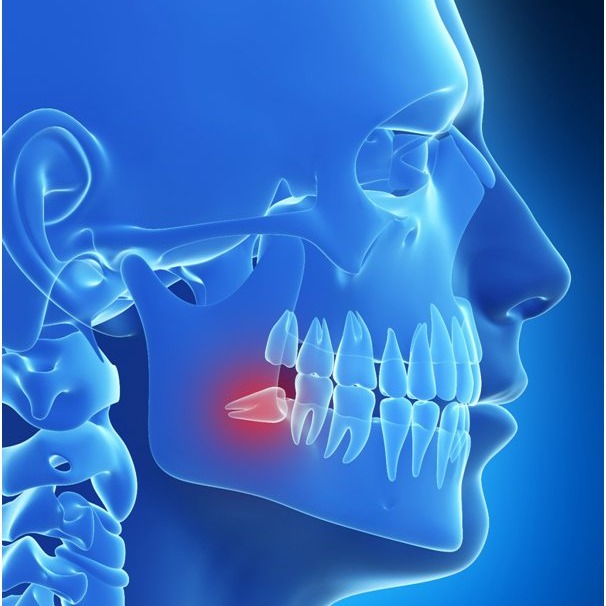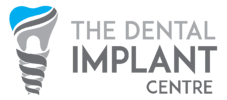An adult dental arch ideally has 32 permanent teeth. Wisdom tooth or third permanent molars are the last to erupt between the age of 17 and 25. In many individuals the jaw bone does not have sufficient space for the wisdom tooth to erupt.

A third molar is typically considered impacted when it does not have sufficient space to emerge in the oral cavity. This may be due to the small size of jaw bone. In some cases, the alignment of the second molar is such that is blocks the path of eruption of the wisdom tooth. Your dentist will advise you get your wisdom tooth extracted if it is impacted. A third molar may be completely covered by the gums (fully impacted), or in some cases emerge partially in the oral cavity showing some part of the crown (partially impacted).
A wisdom tooth sometimes grows towards or away from the second molar or in some cases at right angles. These in radiographic images appear as in lying down position. In most cases, impacted third molar lies dormant in the oral cavity, but if left as such may lead to multiple complications. A partially accessible wisdom tooth, is difficult to clean by oral hygiene aids like toothbrush and dental floss. This leads to food accumulation between the gums and the third molar. The accumulated food leads to bacterial growth, subsequently causing tooth decay and gum diseases. These cavities may also spread towards the adjacent teeth leading to further complications.
In rare cases, an impacted wisdom tooth may also lead to a sac like formation filled with fluid (Cyst). A cyst leads to damage of jaw bone and gums. Hence an impacted wisdom tooth left untreated in the oral cavity may lead to sudden emergencies or the development of long-term complications. Both these cases may then require extensive and expensive interventions. In turn causing undue anxiety and disruptions.
During the initial visit, a dentist will do a thorough examination of your oral cavity. He/she may advise you to undergo an x-ray to determine the position of your wisdom tooth. Post consultation, your dentist may recommend to get your wisdom teeth removed, depending on their condition.
Extraction is usually performed under local anaesthesia. However, if you feel apprehensive, you can opt for sedation or general anaesthesia during the procedure. Wisdom tooth extraction is a routine outpatient procedure in most cases, wherein you can go home on the same day after the extraction.
You must follow all pre-operative procedures enumerated by your dentist, to ensure optimal success. Some simple steps to follow are to have a good meal prior to surgery. As the jaw and lips will be numb two to three hours post-surgery, making it difficult to eat. Clean your oral cavity properly before the extraction to minimize the chances of infection.
During the procedure, the surgeon lifts the overlying gums to expose the wisdom tooth. The tooth is then removed and gums are stitched back together. Minor bleeding is experienced post extraction which can be minimized by applying pressure with the help of a gauze. In most cases healing occurs in a week’s time. You must follow all post-operative care instructions provided by the Dental surgeon to ensure faster recovery.
Certain activities like rinsing the mouth, sucking liquid with a straw, eating hard food and consumption of aerated beverages should be avoided during this period. A clot is formed at the site of extraction to facilitate healing. Indulging in any of the above-mentioned activities may cause the clot to dislodge; leading to exposure of underlying bone and nerves resulting a painful condition called dry socket. You must contact your dentist immediately in such case.
You may also experience minor pain and swelling during the first two-three days post-surgery. Usage of ice pack is advised during the first eighteen hours. You need to place an ice pack on the outside of your face at intermittent intervals. You may also be prescribed pain killers. There may be some side effects like nausea due to this.
Maintaining oral hygiene during the recovery period is of utmost importance. Brushing your teeth using A soft toothbrush to clean all areas of the mouth except the wound and warm saline rinses are advised. In some cases, antibiotics are prescribed, which should be taken as instructed. You will need to visit your dentist 5-7 days post-surgery. During this visit stitches are removed and condition of wound assessed.
Not all wisdom teeth need to be removed. A fully functional third molar which can be cleaned properly need not be removed. Routine review by your dentist, help assess the condition of the wisdom teeth and facilitate preventive measures.
Are you Worried that you have impacted wisdom teeth? Visit any of our Nuffield Dental clinics for consultation and dental treatments.
